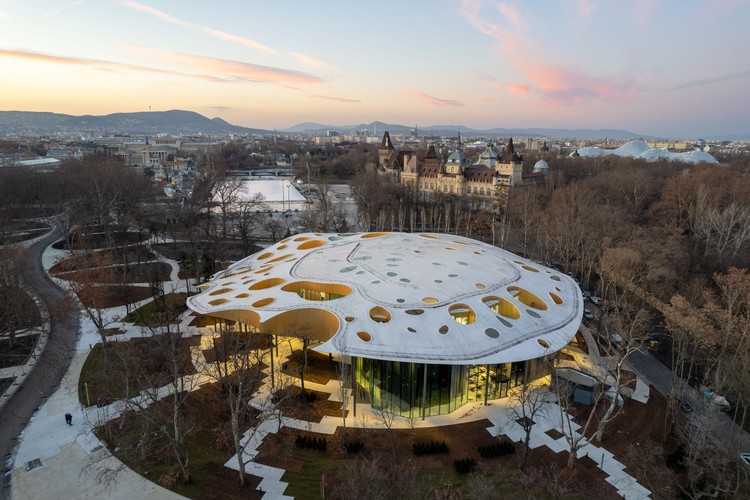Budapest’s city park becomes home to a raging culture war
One of the oldest public parks in the world is in danger, and the opening of far-right prime minister Viktor Orban’s “House of Music” is just the beginning. Photo by Palkó György / Liget Budapest
March 21, 2022
This past January, the Hungarian House of Music officially opened for business in the nation’s capital of Budapest, and while the building has been lauded by some for its futuristic design, beneath the canopy lies a web of controversy.
The museum, built by Sou Fujimoto, is dedicated to being a music museum first, with exhibits on Western music, the traditions of Hungarian music, as well as a room dedicated to Hungarian nationalism. Because what’s a music museum without Hungarian nationalism?
Centered within Városliget, Budapest’s City Park, the museum is located within Buda, the old city within Budapest and the historic capital of the Kingdom of Hungary. The area has been of specific interest to right-wing Prime Minister Viktor Orban, who moved into the historic complex of Hungarian kings, the Buda Castle, just a few years ago.
The museum is the first stage in “Liget Budapest,” a plan to completely upend City Park and replace it with a museum district. But the project has been the focus of civil resistance for years, criticized for the total elimination of park space when pedestrians have been frustrated with the lack of public park space.
Protests over Liget Budapest peaked in 2016 when over 600 people fought back against the cutting down of trees. However, as the press has focused more on the development of the Hungarian House of Music, less attention has been paid to the trees that were cut down to make space for the new building.
“Liget Budapest” is a great example of right-wing populism interfering with a city’s issues. The new building provides a great excuse for the lack of social welfare in Hungary. While the wealth disparity grows in Hungary, with Orbán granting companies tax loops like Halloween candy, what better way to enjoy your authoritarian nightmare than by going to a for-profit museum that is growing within a public park like a tumor?
In Hungary, social welfare is handled in a much more paternalistic way than in the United States. Peasantry and dependence on the state are purposeful outcomes as they were a hundred years ago. Orbán’s public works grift works hand in hand with his work to establish a permanent unskilled workforce. Yet for those under the thumb of Orbán, such as Hungary’s Roma population, the Hungarian House of Music is a sign that things are not changing any time soon.

